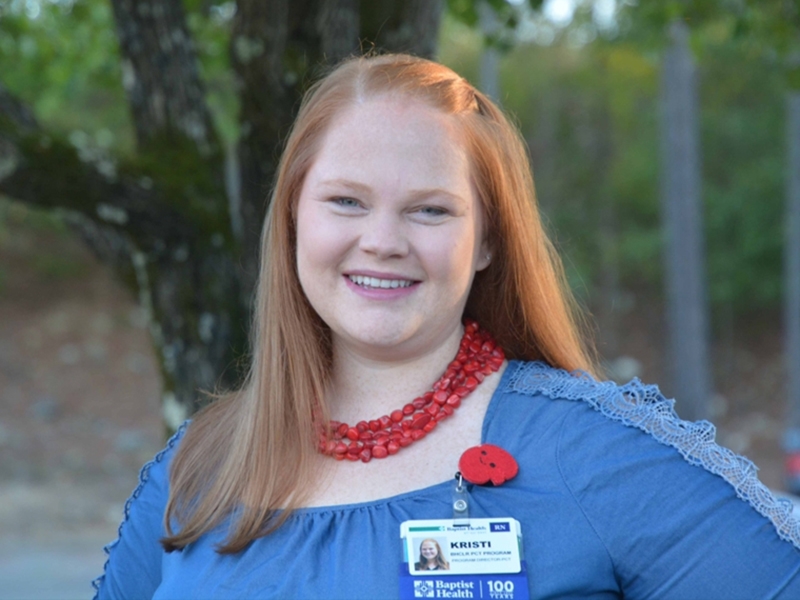Gerbert Floreschavez served as a nurse in different capacities — as a bedside nurse, preceptor, nurse instructor and unit manager — until he retired from the military in 2020.
At the height of the global pandemic, he met Jan Emory, an associate professor in the College of Education and Health Professions' Eleanor Mann School of Nursing. Floreschavez, a veteran and native of El Salvador, was accepted into the master's-level nurse educator program and was relieved to learn about the Nurse Faculty Loan Program (NFLP).
"The program has allowed me to focus on learning rather than who will pay for school," he said. "After graduation, 85% of the loan can be forgiven if I serve as a nursing faculty, which I intend to do. I am thankful."
The federal loan repayment program, offered by the U.S. Department of Health & Human Services: Health Resources and Services Administration, aims to increase the number of nursing students pursuing careers as full-time faculty to teach in nursing schools. Full-time or part-time graduate students are eligible to apply.
The average age of nurse educators continues to rise, so it's critical to invest in new faculty to prepare the next generation of nurses.
"A shortage of nurses in the workforce is dependent upon the nursing faculty to teach them," Emory noted. She was instrumental in gaining additional funding this year to help address the nursing shortage by offering loan forgiveness for Doctor of Nursing Practice (D.N.P.) and Master of Science in Nursing (M.S.N.) students who want to teach future nurses.
The Eleanor Mann School of Nursing received $400,000 in NFLP grants this year, which will cover students' tuition and other expenses over the duration of their selected program. The nursing school's NFLP funding is not new, but the amount available to students has increased significantly, Emory said.
Awarded funds are distributed to students as low-interest loans. After the student graduates and begins working as a full-time faculty member, up to 85% of the NFLP loan may be completely forgiven.
The U of A's online M.S.N. program was well-timed for Kristi Fonner, and the NFLP scholarship will help her achieve her goal of working full time as a nurse educator. "I wanted my master's in nursing education because I've been working as faculty since 2021 and absolutely love it," she said. "My goal is to continue teaching because I genuinely enjoy it, and so far, it seems my students really connect with my teaching style and ability to lead them. I currently work with future PCT, LPN and RN students at Baptist Health College Little Rock. My main position is with the RN students, but I help with other programs as needed."
Fonner decided to go into nursing after her mom passed away from kidney cancer. "I wanted to be a better nurse than some of the awful ones we encountered in her 18 months trying to fight the cancer," she said. "I started out as an L.P.N. because I could go straight into the program with no prerequisites. I worked as an L.P.N. while taking night classes to complete my prerequisites. I was a single mom of two while doing this also."
Fonner returned to school for her RN degree in 2018. She has a few more years to go before earning her M.S.N. degree from the U of A. She can't wait to see her name on Senior Walk. "One of my great uncles is on the sidewalk, as well as my ex-husband, and I wanted my teenagers to get to see my name on that sidewalk also," she said. "The U of A has a high level of respect in the nursing field, which was also very important to me."
Fonner, who is remarried, also has two children under 2. She said the NFLP loan has been an enormous gift. Post-graduation, Fonner hopes to continue teaching at Baptist Health College.
Floreschavez plans to teach nursing at the University of Arkansas Fort Smith School of Nursing. He's excited to get started. "As a nursing professional, everything I learned and experienced has value — this knowledge I want to pass along and facilitate shape the next generation of nurses," he said. "However, knowledge alone is not sufficient to care for patients. A nurse should be caring, empathetic and, more importantly, be able to treat everyone with dignity and respect. This is the nursing philosophy I want to share with my students."
Topics
Contacts
Shannon G. Magsam, director of communications
College of Education and Health Professions
479-575-3138,
